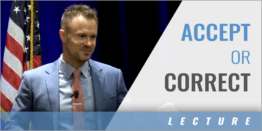|
Provided by: Raise your Game When I interviewed Chris Collins, head coach at Northwestern and son of the legendary NBA coach and broadcaster Doug Collins, he spoke openly about how belief comes after a tipping point. It took a couple of years for him to bring his team to the point where the belief that they would win carried them over the hump. "The common trait you see with all winning teams or winning businesses," he told me, "there's a swagger that those teams carry when they take the court. They believe they're supposed to win. I think that really shines through when you're in a close game...when you believe you're supposed to win, it can carry you through, it can will you to be successful." Chris spoke to me about how his understanding of the power of belief arose out of the way his father raised him. Doug Collins never let his son win at anything - like another dad I know - because he wanted Chris to believe in his own abilities to will an outcome. Once Chris finally did beat his dad, that belief was solidified internally and brought to every other game he played. Now he shares it with his players. In their book Tribal Leadership, authors Dave Logan, John King, and Halee Fischer-Wright discussed their ten-year, 24,000-person study of effective workplace cultures. The winner, what they called a Stage Five culture, is made up of "pure leadership, vision, and inspiration' and was found at places like Pixar and Apple. This type of culture was extremely rare, and made up less than 2 percent of the businesses they examined. What stood out the most was this explanation of how much Stage Five members are committed to their work: "People who have been part of a Stage Five tribe - or even seen one at work - often describe it in the same tone of reverence and gratitude they use to tell stories of their kids."* Now, I'm not advocating that you should care more about work than your family; you shouldn't. The point is that the excitement, the sense of possibility, the positive energy that these people brought to their jobs shows what can happen if the key ingredient of belief is there. One of the things I repeatedly emphasize in my talks to corporations is that businesses are made of people. It seems obvious, but it's something that is so basic, so foundational, that it gets missed. If we remind ourselves of this fact, many issues involving effort, care, and incentives that hurt businesses become easier to solve. People are driven by desires, fears, needs, and motivations. A tight-knit team regularly taps into the well of belief because they know it's the emotion - the engine - that powers everything else. Belief is when a group's positivity and confidence meet their trust and commitment. They think they can do it, and they put their minds and hands together to get it done. They will it into existence. Key Point: Though it's made up of different people, a team comes together over a collective belief in an idea and a mission. Remember: Success comes when commitment meets belief. Set goals that are both realistic and just out of reach - belief will help you cross the divide. The best leaders are able to cultivate a powerful feeling of belief within the team and tap into it consistently. Lack of belief from one player can pull everyone and everything down. Refuse to accept any holes or cracks in the group's sense of belief. An important aspect in creating a culture of belief is creating a sense of accountability. If a rule doesn't exist for one, it doesn't exist at all. * Emphasis is mine. |






